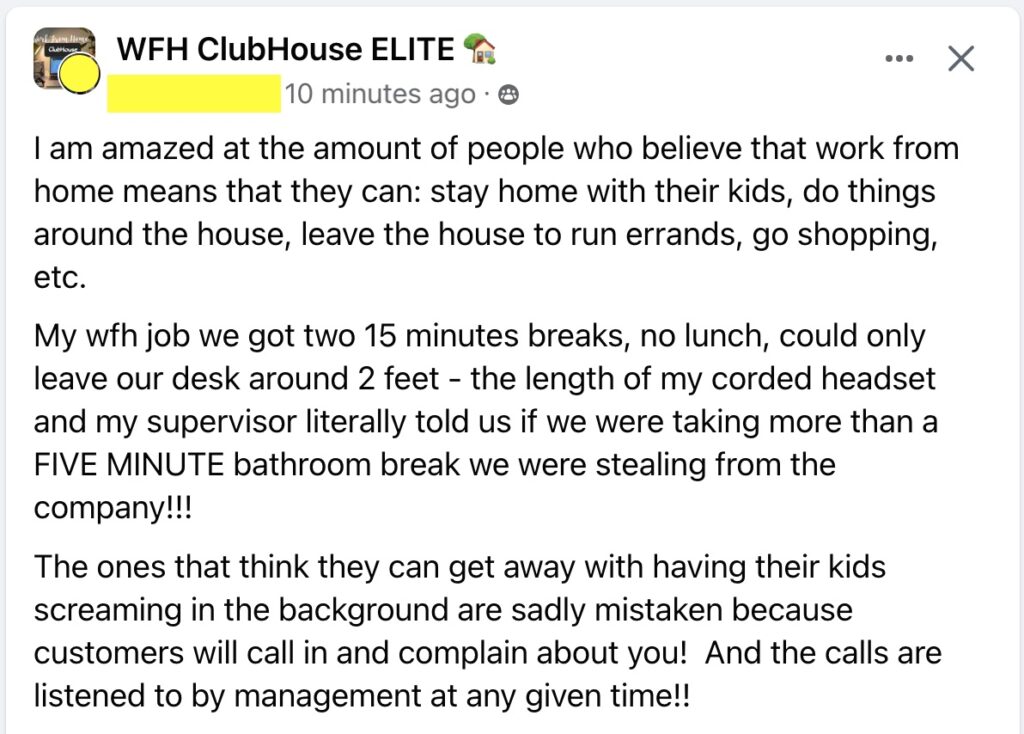A truth bomb from a Facebook group I follow, for people that want to work from home:

Most work-from-home jobs are customer service jobs, for insurance companies, airlines, subscription TV services, etc., and you don’t work when you want: you have a fixed, strict schedule. And these jobs don’t pay well. The trade-off is, of course, that you get to work from home, but if you think you are going to be doing child care at the same time, think again!
I work from home most of the time, and I don’t have a strict fixed schedule: I work in marketing and press relations for one nonprofit, I manage the online community for another, and I pick up marketing or volunteer management-related gigs here and there. I work from home 90% of the time, and I don’t have a strict schedule: I can walk my dog when I want, for the most part, I can take a break to watch a movie on TCM if I have time in the middle of the day, I can sleep late some days… but I have to work real hours most every day, and I can’t have distractions while I’m working. The deadlines are real. And I have to be available for phone calls and emails from clients. As flexible as my schedule is, there is NO room in it for child care.
The myths around working from home are important to me for three reasons:
There are so many work-from-home scams out there. I have a plate on my web site about What Work-At-Home / Remote Jobs Look Like and how to avoid scams because there are so many scams (and so many people falling for them).
There are so many desperate people in developing countries that believe the myths about working from home, that think it’s work you can do with just a smart phone and you can do whenever you might have some time, that you don’t need a computer or absolutely perfect and fast Internet access. They are among the prime targets for work-from-home scams.
The myths about working from home are similar to myths about virtual volunteering: that volunteering roles online don’t require a schedule (they do – extra time for online volunteering does not magically happen), that the deadlines aren’t strict (they are – if you don’t do an assignment, it often leaves the nonprofit scrambling to get something essential done that they were counting on you for), that you don’t need any skills (you do), etc. Here’s a list of myths about virtual volunteering, from the Virtual Volunteering Wiki.

There are a LOT of parallels between working online from home and volunteering online from home. My book The Last Virtual Volunteering Guidebook is focused primarily on people who want to engage online volunteers, and covers how to create online roles, and how to properly onboard and support online volunteers during their engagement. If you are a manager of online employees, you might find it helpful. It’s available both as a traditional print publication and as a digital book.

If you have benefited from any of my blogs or other parts of my web site and would like to support the time that went into researching information, developing material, preparing articles, updating pages, etc. (I receive no funding for this work), here is how you can help.

Thank you for this, Jayne. WFH is typically shown to be idyllic for the worker. You so insightfully point out that a) much of WFH is for pay-by-piece exploitative low-level labor (like telemarketing), and b) that exempt professionals really treat it like”working less” not “working full time from home.”
The elitism shown by the WFH proponents is so troubling.
“The elitism shown by the WFH proponents is so troubling.”
YES! That they don’t acknowledge the profound inequities and realities that contribute to people who CANNOT work from home is really, really troubling.